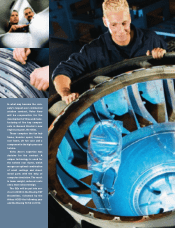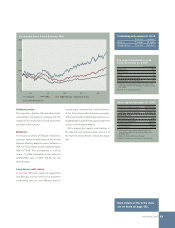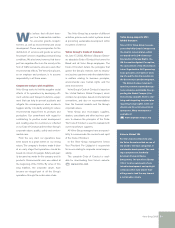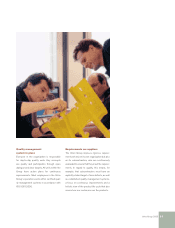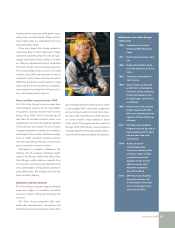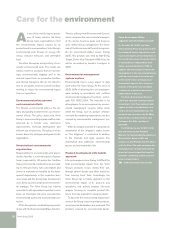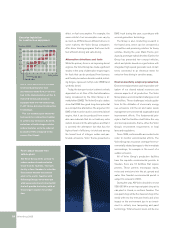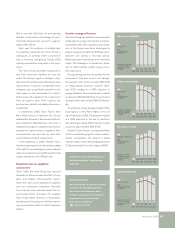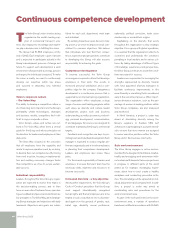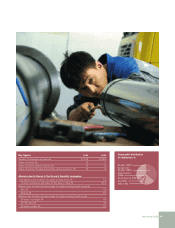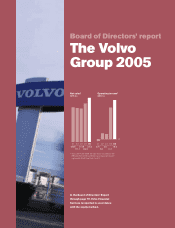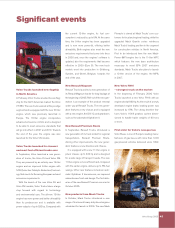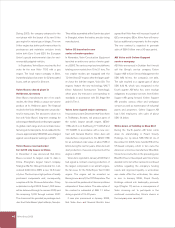Volvo 2005 Annual Report Download - page 40
Download and view the complete annual report
Please find page 40 of the 2005 Volvo annual report below. You can navigate through the pages in the report by either clicking on the pages listed below, or by using the keyword search tool below to find specific information within the annual report.
36 Volvo Group 2005
As one of the world’s largest produ-
cers of heavy vehicles, the Volvo
Group feels responsibility to limit
the environmental impact caused by its
products a nd its own operations. Volvo G roup’s
environmental work focuses on energy effi-
ciency, reduced emissions and alternative
fuels.
The Volvo Group has a long history of suc-
cessful environmental work. The results are
clearly evident in products that are increas-
ingly environmentally adapted and in the
reduced impact from our production facilities
and internal transports. We do not intend to
rest on our laurels, however, but will continue
working to reduce the environmental impact
from our operations.
Environmental policy governs
environmental efforts
The Group’s environmental policy is the pri-
mary and guiding instrument for our environ-
mental efforts. The policy states that Volvo
Group’s environmental program shall be char-
acterized by a holistic view, continuous
improvements, technical development and
efficient use of resources. The policy is in turn
broken down into strategies and goals for the
organization.
Decentralized environmental
organization
Responsibility for environmental work at pro-
duction facilities is a normal aspect of opera-
tional responsibility. All production facilities
have environmental coordinators. Issues relat-
ing to emission levels, fuel consumption and
choice of materials are handled by the devel-
opment departments in the respective busi-
ness areas and the Group-wide development
units. Every business area has an environmen-
tal manager. The Volvo Group has internal
consultants, with specialized expertise in such
areas as chemicals, life-cycle assessments,
environmental audits and environmental pro-
tection.
At the Group level, coordinating responsibil-
ity lies with the Environmental Affairs function.
There is a Group-wide Environmental Council,
which comprises the environmental managers
of the various business areas and business
units. Within Group management, the Chair-
man of the Environmental Council is responsi-
ble for environment-related issues. During
2005, this position was held by Karl-Erling
Trogen, Senior Vice President of AB Volvo. He
will be succeeded by Jan-Eric Sundgren in
2006.
Environmental management
system in place
Environmental care is a key aspect of daily
work within the Volvo Group. At the close of
2005, 96% of all production unit employees
were working in accordance with certified
environmental management systems – princi-
pally ISO 14001:2004. The objective is for
all employees to be encompassed by environ-
mental management systems. Other areas
within the Group, such as product develop-
ment and the market ing or ga ni zat io ns , a re also
covered by environmental management sys-
tems.
When a company or property is acquired, an
examination of the company’s status, known
as “due diligence,” is conducted. In addition
to the financial and legal aspects, this
examination also addresses environmental
factors and environmental risks.
Product development with holistic
approach
Life-cycle analyses show that up to 90% of the
total environmental impact from the Volvo
Group’s products occurs during their use,
through carbon dioxide and other emissions
from burning fossil fuels. Accordingly, the
Volvo Group has a holistic approach to the
environmental impact of its products and
operations, and actively employs life-cycle
analysis focusing on complete product life-
times, from raw materials to waste products.
To describe the environmental impact from
some of the Group’s most important products,
environmental declarations are produced. The
products covered by environmental declar-
Volvo Environment Prize
supports environmental research
On October 26, 2005, the Volvo
Environmental Prize was presented for
the sixteenth time to researchers who
have made significant contributions in
the environment area. The prize, which
is awarded by an independent foun -
dation, was established in 1988 to
support and encourage research and
development in the environmental area
and has since grown to become one
of the world’s most prestigious en-
vironmental awards. Over the years,
winners of the prize have included
a number of prominent researchers
and pioneers in the area.
The Volvo Environment Prize for
2005 was awarded to two prominent
researchers from the southern hemi-
sphere for their contributions in the
field of conserving biodiversity. The
research was carried out by Dr. Mary
Kalin Arroyo, working in Chile, and
Professor Aila Keto, working in
Australia.
The 2005 prize, worth SEK 1.5 M,
was presented by the Swedish
Minister for Sustainable Development,
Mona Sahlin, Volvo’s CEO, Leif
Johansson, and Fredrik Arp, President
of Volvo Cars. The prize ceremony has
developed into an important meeting-
place for interested parties from the
business community, politics and vol-
untary organizations.
www.environment-prize.com
➡
Care for the environment


